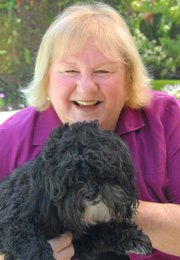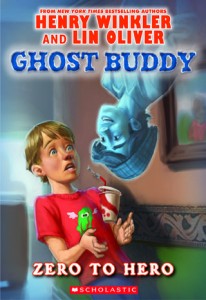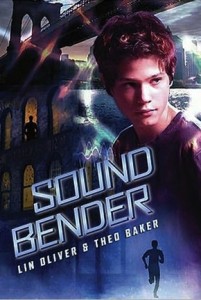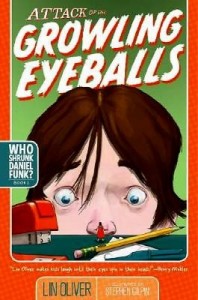Dear Readers…
DearEditor.com’s Revision Week continues with co-authors Lin Oliver, Henry Winkler, and Theo Baker. All three authors team up today to discuss the part collaboration plays in the revision of series and chapter books for young readers.
Please join Lin, Henry, Theo, and The Editor for Day 4 of Revision Week, and find out how to win today’s “Free Partial Edit” from The Editor.
Lin Oliver has written several series with her co-authors—17 best-selling “Hank Zipzer” books and now three best-selling “Ghost Buddy” books with Henry Winkler, and the brand new “Sound Bender” series with Theo Baker—plus a series of her own, the “Who Shrunk Daniel Funk?” series. These prolific co-authors have learned a thing or two about revision. They’ve joined forces once again in an insightful tag-team interview for Revision Week.
*After the interview are instructions for entering today’s Free Partial Edit Giveaway.
How does revision work within a collaboration?
 LIN: The first step in revising with a collaborator is to agree on what you want to revise. Even when working with someone with whom you’re very attuned, you will always have differences of opinion, or differences in ear—how you hear the words. A lot of back and forth conversation is involved in deciding what changes you want to make in your manuscript, and often, one of the two partners has to compromise. It helps to know each other’s strengths and weaknesses, so you can fairly adjudicate your differences of opinion. Working with Theo on Sound Bender, he thinks I tend to go for the funny rather than the dramatic. He’s right, and knowing that helps us realize my limitations. I think he’s sometimes too long-winded, so I always want to trim his material. (He calls me Dr. Scissorhands.) You have to be very flexible in your negotiations so both parties come away feeling ownership of the final draft, and also very sensitive not to make it a critique of your partner’s talents but a decision of what works best at any given moment in the manuscript.
LIN: The first step in revising with a collaborator is to agree on what you want to revise. Even when working with someone with whom you’re very attuned, you will always have differences of opinion, or differences in ear—how you hear the words. A lot of back and forth conversation is involved in deciding what changes you want to make in your manuscript, and often, one of the two partners has to compromise. It helps to know each other’s strengths and weaknesses, so you can fairly adjudicate your differences of opinion. Working with Theo on Sound Bender, he thinks I tend to go for the funny rather than the dramatic. He’s right, and knowing that helps us realize my limitations. I think he’s sometimes too long-winded, so I always want to trim his material. (He calls me Dr. Scissorhands.) You have to be very flexible in your negotiations so both parties come away feeling ownership of the final draft, and also very sensitive not to make it a critique of your partner’s talents but a decision of what works best at any given moment in the manuscript.
 THEO: It’s completely different than working alone. For one thing, you always have a nominally sympathetic reader waiting for pages—so there’s no need to put drafts in a drawer to try to forget about them before revising. But while revision is sometimes much more difficult flying solo, revising with a collaborator can often be much more painful! If something doesn’t work for your partner—even if it’s something you love—it skips the drawer and goes directly into the garbage can.
THEO: It’s completely different than working alone. For one thing, you always have a nominally sympathetic reader waiting for pages—so there’s no need to put drafts in a drawer to try to forget about them before revising. But while revision is sometimes much more difficult flying solo, revising with a collaborator can often be much more painful! If something doesn’t work for your partner—even if it’s something you love—it skips the drawer and goes directly into the garbage can.
When you’re writing a series, you know your characters well. How many drafts are needed once you get a series established? What kinds of things are you refining at that level?
LIN: The first book in a series is always the most difficult because you are discovering your characters’ voices, peculiarities, habits, backstory. Many drafts are necessary to deepen your understanding and portrayal of your characters. I find that several books into the series, the voices come very naturally and require less conscious effort. However, plot is always a sticky point for me, and that always requires revision and tweaking to keep the tension going and the scenes relevant. I also find that in series, you have to be a strict cutter, because when you know the characters so well, it’s easy to let them ramble on a bit, and those digressions—although interesting—can really stall the story.
THEO: Though I’ve only written two books about the same characters, writing one book is enough to get to know your characters well. Too well, in fact. In writing Sound Bender 2, I just plodded along with my boys (and girls), and then after the fact, we went back and established most of the major characters so our readers wouldn’t be quite so lost! Readers may read books in a series continually, or they may space out the books by years. I think most readers, even very good ones, are mostly confused most of the time. So we try to help them as much we can with character info early and often. Makes the reading experience a little less tense.
How early does your editor come into each new book?
 HENRY and LIN: Our editors are always involved in the concept phase—both formulating the concept for the series and in a conversation about the plot line in general. Usually, we have to submit a title early on in the process, for marketing purposes, so the title often helps define the concept. Then we go away and write the book, and the editor comes back to us with notes after we submit the first draft. Often there is a second set of notes, usually much more specific in nature, and we make those adjustments. That pass allows us to do a line polish of our own, having had some time and distance from the manuscript. That’s when we go through and take out a weak joke, an unnecessary adjective, a flabby verb, an unnecessary line of dialogue.
HENRY and LIN: Our editors are always involved in the concept phase—both formulating the concept for the series and in a conversation about the plot line in general. Usually, we have to submit a title early on in the process, for marketing purposes, so the title often helps define the concept. Then we go away and write the book, and the editor comes back to us with notes after we submit the first draft. Often there is a second set of notes, usually much more specific in nature, and we make those adjustments. That pass allows us to do a line polish of our own, having had some time and distance from the manuscript. That’s when we go through and take out a weak joke, an unnecessary adjective, a flabby verb, an unnecessary line of dialogue.
THEO: The editors come in at the very earliest stages—and are usually the ones who remind you that you owe them another book, and for the love of coffee, you should probably get started on it. They usually want a brief outline or synopsis up front—just to know that you’ve got a sound map to follow, so they can sleep at night. Editors are great at this stage; they read so much and in such a particular way that they can see problems way down the road. Once they’ve helped you with your map, then they leave you alone for several months—ostensibly so you can write.
Henry, the Ghost Buddy series is a new one for you and Lin. Did the first manuscript fall into place quickly, or did it take a few rounds to settle into the new characters and voices?
 HENRY: As I remember, because we are now happily on our third Ghost Buddy, it did take a little longer than usual to do the first book in the series. Billy Broccoli and The Hoove, our main characters, were pretty clear. It was the supporting characters that needed to become fully alive to us. We also worked really hard on the rules of having a ghost in the story—to set a clear and consistent set of rules and hold ourselves to them. This is not an easy task. (Watch Henry and Lin talk about writing the Ghost Buddy series here.)
HENRY: As I remember, because we are now happily on our third Ghost Buddy, it did take a little longer than usual to do the first book in the series. Billy Broccoli and The Hoove, our main characters, were pretty clear. It was the supporting characters that needed to become fully alive to us. We also worked really hard on the rules of having a ghost in the story—to set a clear and consistent set of rules and hold ourselves to them. This is not an easy task. (Watch Henry and Lin talk about writing the Ghost Buddy series here.)
Lin, your new supernatural series “Sound Bender” (with Theo) is for older readers and has an edgier, more adventurous tone than your books with Henry. How has working with a new collaborator on a new project for a new audience affected your approach to shaping a story?
 LIN: Well, it’s important to note that my new collaborator is also my son, which complicates the interaction in both blissful and complex ways. We have to work hard not to make this a mother-son relationship, but an interaction between two colleagues of equal ability. Theo has a great sense of adventure and is always very close to what our key readers … tween boys … are interested in. I always defer to him in those areas. I am a bear about staying on story, keeping the tension high, making sure each scene serves a purpose in advancing the story, keeping things pacey. Theo, I think, is willing to tolerate a more meditative pace. We bump into each other a lot on that spectrum…how fast to move the story, how much digression to include, how much scientific and historical fact to highlight. The happy news is that I believe both Sound Bender books have benefitted from our collaboration and specifically from our having to work out this very issue. They are deeper than they would have been if I had written them alone, and quicker than they might have been had Theo written them alone. I think this is one instance when compromise resulted in a better all around book.
LIN: Well, it’s important to note that my new collaborator is also my son, which complicates the interaction in both blissful and complex ways. We have to work hard not to make this a mother-son relationship, but an interaction between two colleagues of equal ability. Theo has a great sense of adventure and is always very close to what our key readers … tween boys … are interested in. I always defer to him in those areas. I am a bear about staying on story, keeping the tension high, making sure each scene serves a purpose in advancing the story, keeping things pacey. Theo, I think, is willing to tolerate a more meditative pace. We bump into each other a lot on that spectrum…how fast to move the story, how much digression to include, how much scientific and historical fact to highlight. The happy news is that I believe both Sound Bender books have benefitted from our collaboration and specifically from our having to work out this very issue. They are deeper than they would have been if I had written them alone, and quicker than they might have been had Theo written them alone. I think this is one instance when compromise resulted in a better all around book.
Do you share your manuscripts with kids to test them out?
HENRY: No, we don’t. If we laugh in the room, it goes in the book. If the rhythms we come up with in telling the story land easily on the ear, it goes in the book. If the theme moves us emotionally, it becomes the book.
THEO: I share them with my inner child, but no actual kids. I was a tough and discerning eleven-year-old—most of them are; they can spot lies and phoniness a mile away. My inner child will respond right away to anything fake with a devastating eye-roll and a sarcastic, “Yeah right, that’s so stupid.” He’s tough, and it hurts every time.
Lin, do you use critique partners when you write your “Who Shrunk Daniel Funk?” series, which is not a collaboration?
 LIN: I don’t use critique partners, but I have several first readers who are central to me. I always talk through the plot with Steve Mooser, my SCBWI partner of the last 40 years. He is invaluable when it comes to hearing a story and foretelling whether it will work. Plot is always the area where I need the most help. When it comes to actually writing the scenes, I’m pretty sure-footed with my particular comedic voice. However, I’m about to begin doing research on a new kind of novel for me, a multi-generational historical saga, and I’m hoping to use critique partners there. It’s a brand new tone for me, and I’m sure I’ll need smart feedback.
LIN: I don’t use critique partners, but I have several first readers who are central to me. I always talk through the plot with Steve Mooser, my SCBWI partner of the last 40 years. He is invaluable when it comes to hearing a story and foretelling whether it will work. Plot is always the area where I need the most help. When it comes to actually writing the scenes, I’m pretty sure-footed with my particular comedic voice. However, I’m about to begin doing research on a new kind of novel for me, a multi-generational historical saga, and I’m hoping to use critique partners there. It’s a brand new tone for me, and I’m sure I’ll need smart feedback.
Can you share an experience of having a story problem you didn’t think you could solve but eventually did?
LIN: My story problems are always in the Second Act. I usually know the First Act, establishing the problem. And I usually know the Third Act, solving the problem. Where I stumble is in the middle, trying to create complications that are relevant to the story and build tension. In the second Sound Bender, which Theo and I just finished, we really struggled with the middle. Our hero, Leo, has to find the other half of a mysterious Siamese twin mask from Borneo. He uses his sound bending powers to do so. The middle of the story involves a trip to Borneo, and a journey down the river into the jungle (an homage to Conrad’s Heart of Darkness). What was really tough was how to make all the adventures on the river build tension and not be just exciting episodic events. In the end, we had to cut that act by at least half, to get rid of those scenes that were temporarily exciting but did not really contribute to the building of tension. It was miserable work, getting through that Second Act. We got lost on that damn river so many times before we could paddle our way out.
THEO: There’re so few rules in writing that I’ll latch onto anything that seems wise or helpful. One aphorism I like (and have no clue to its origin) is: If the narrative seems slow, that means you’re not focusing on the right things. (paraphrased)
If a story isn’t working, it seems flat, lifeless. And the reason why it feels lifeless is almost always because the main character is so overwhelmed with story and narrative beats that he can’t be himself, and can’t respond like a living person.
When I’m staring at a lifeless scene, one thing I like to do is what I call an “emotional draft.” When revising, it’s easy to get so bogged down in the weeds of language, story development, the “way it should be” that it can feel suffocating—both for you and the character. So the “emotional draft” is a blank page draft, where I just focus solely on what the characters are actually feeling in the moment, while momentarily forgetting about all the other work on that scene I’ve already done. It’s a very safe and playful exercise, and a great way to add life into empty words.
What’s the most drastic thing you’ve done to a story while revising?
HENRY and LIN: We usually have a very concise and clear outline before we start writing. What amazes us each time we write a book is that the story itself has a mind of its own and when we’re trying to go right, it often goes to the left. We have learned to faithfully follow, even if the result is a drastic change from the original plan.
LIN’s additional note: I often find I have to cut a character completely. I love to build in supporting roles, and on many occasions, have fallen in love with a character who doesn’t really have a vital role to play. I let myself write that character in the first draft, and then have to examine whether or not they’re just taking up space, no matter how charming I think they might be. I have an imaginary room in my house where those characters live. They’re all banging on the door trying to get into the next book. Some of them make it.
THEO: Short of incinerating entire drafts while sobbing, we’ve cut whole characters, whole finished chapters, whole subplots, etc. In our latest book, Sound Bender 2, we took a 140-page section and crunched it down into twenty-five compact pages. Lin says there’s nothing wasted in writing, but I think she’s full of it.
How do you know you’ve got the final draft?
HENRY and LIN: We know it’s done when we literally have come to the end of the story. Then we send it to our editors and get their thoughts. We carefully go over every thought and decide which ones resonate intellectually and emotionally. In the nineteen novels we have written together, we have never really had a major disagreement with our publishers that required us to change anything about what the book is that we imagined it to be.
LIN’s additional note: I have never read a published book of mine where I didn’t wince from wanting to go back and change it. I think this supports my belief that a book isn’t really done, it’s due. And thank goodness for that, or we’d just go on revising and tinkering forever.
THEO: There is no final draft. There are no endings, only countless beginnings. Just try to do your best work in the time you have, then beg and plead for another extension.
TODAY’S GIVEAWAY:
The Editor is giving away yet another FREE PARTIAL EDIT of your manuscript. Note that the winner of today’s giveaway IS eligible for Saturday’s grand prize Full Manuscript Edit Giveaway. Here are the rules, with a bonus entry available to DearEditor.com subscribers:
- Your manuscript can be of ANY GENRE or CATEGORY (for adults or children, fiction or non-fiction), including picture books.
- The partial edit will cover the FIRST CHAPTER of your manuscript. In the case of a picture book entry, the edit will cover the entire manuscript—but the manuscript cannot exceed 7 double-spaced, 12-pt font pages.
- Deadline: MIDNIGHT tonight, March 8, 2012, PST.
- Winner will be randomly selected using Randomizer.org and announced on March 9, 2012, in the DearEditor.com comments section and on the DearEditor.com Facebook page, and the winner will be notified directly via email.
TO ENTER:
One entry – SEND EMAIL to DearEditor.com using the “Write to The Editor” button at the top of the blog or by clicking here. Type “Free Partial Edit Giveaway” in the subject line. In the body of the email, include the TITLE of your manuscript and YOUR FULL NAME. (If you have any difficulty with the contact button, send an email entry directly to dear-editor@hotmail.com.) Do not attach or embed any part of your manuscript in the entry.
Bonus entry – SUBSCRIBE. DearEditor.com subscribers get a bonus entry by sending a second email with “Subscriber’s Bonus Giveaway Entry” in the subject line and your title and full name in the body. (Note: the Editor will verify!) Not a subscriber yet? Then subscribe now by clicking on the “Subscribe” button at the top of DearEditor.com and then email your second entry.
Anyone who doesn’t follow these rules will be disqualified, at the Editor’s discretion.
Disclaimer: The Editor does not share or in any other way use your contact information; it’s collected solely for winner contact purposes at the end of the giveaway.
Good luck!